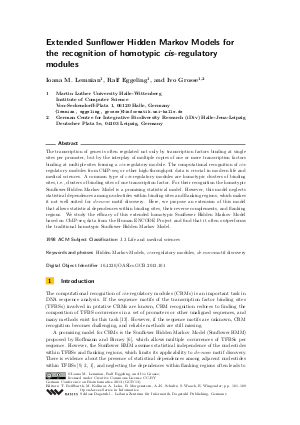Extended Sunflower Hidden Markov Models for the recognition of homotypic cis-regulatory modules}
Authors Ioana M. Lemnian, Ralf Eggeling, Ivo Grosse
-
Part of:
Volume:
German Conference on Bioinformatics 2013 (GCB 2013)
Part of: Series: Open Access Series in Informatics (OASIcs) - License:
 Creative Commons Attribution 3.0 Unported license
Creative Commons Attribution 3.0 Unported license
- Publication Date: 2013-09-09
File

PDF
OASIcs.GCB.2013.101.pdf
- Filesize: 0.49 MB
- 9 pages
Document Identifiers
Subject Classification
Keywords
- Hidden Markov Models
- cis-regulatory modules
- de-novo motif discovery
Metrics
- Access Statistics
-
Total Accesses (updated on a weekly basis)
0Document
0Metadata
Abstract
The transcription of genes is often regulated not only by transcription factors binding at single sites per promoter, but by the interplay of multiple copies of one or more transcription factors binding at multiple sites forming a cis-regulatory module. The computational recognition of cis-regulatory modules from ChIP-seq or other high-throughput data is crucial in modern life and medical sciences. A common type of cis-regulatory modules are homotypic clusters of binding sites, i.e., clusters of binding sites of one transcription factor. For their recognition the homotypic Sunflower Hidden Markov Model is a promising statistical model. However, this model neglects statistical dependences among nucleotides within binding sites and flanking regions, which makes it not well suited for de-novo motif discovery. Here, we propose an extension of this model that allows statistical dependences within binding sites, their reverse complements, and flanking regions. We study the efficacy of this extended homotypic Sunflower Hidden Markov Model based on ChIP-seq data from the Human ENCODE Project and find that it often outperforms the traditional homotypic Sunflower Hidden Markov Model.
Cite As Get BibTex
Ioana M. Lemnian, Ralf Eggeling, and Ivo Grosse. Extended Sunflower Hidden Markov Models for the recognition of homotypic cis-regulatory modules}. In German Conference on Bioinformatics 2013. Open Access Series in Informatics (OASIcs), Volume 34, pp. 101-109, Schloss Dagstuhl – Leibniz-Zentrum für Informatik (2013)
https://doi.org/10.4230/OASIcs.GCB.2013.101
BibTex
@InProceedings{lemnian_et_al:OASIcs.GCB.2013.101,
author = {Lemnian, Ioana M. and Eggeling, Ralf and Grosse, Ivo},
title = {{Extended Sunflower Hidden Markov Models for the recognition of homotypic cis-regulatory modules\}}},
booktitle = {German Conference on Bioinformatics 2013},
pages = {101--109},
series = {Open Access Series in Informatics (OASIcs)},
ISBN = {978-3-939897-59-0},
ISSN = {2190-6807},
year = {2013},
volume = {34},
editor = {Bei{\ss}barth, Tim and Kollmar, Martin and Leha, Andreas and Morgenstern, Burkhard and Schultz, Anne-Kathrin and Waack, Stephan and Wingender, Edgar},
publisher = {Schloss Dagstuhl -- Leibniz-Zentrum f{\"u}r Informatik},
address = {Dagstuhl, Germany},
URL = {https://drops.dagstuhl.de/entities/document/10.4230/OASIcs.GCB.2013.101},
URN = {urn:nbn:de:0030-drops-42361},
doi = {10.4230/OASIcs.GCB.2013.101},
annote = {Keywords: Hidden Markov Models, cis-regulatory modules, de-novo motif discovery}
}
